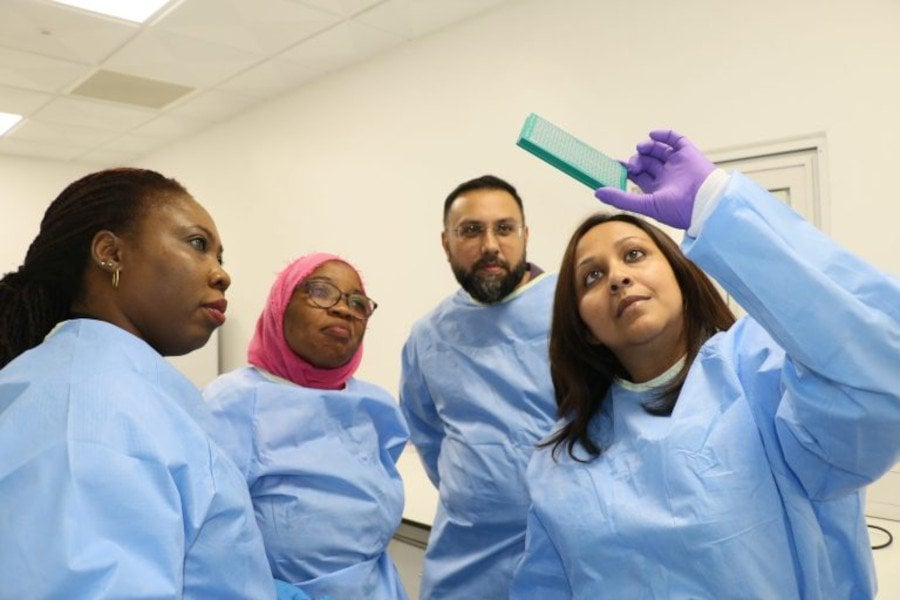
The Malaria Population Biology (MPB) Group at the Medical Research Council Unit The Gambia at the London School of Hygiene & Tropical Medicine (MRCG at LSHTM) in collaboration with the Wellcome Sanger Institute (WSI) has concluded an intensive training on amplicon sequencing for Genomic Surveillance of Malaria (GSM) at the Unit’s campus in Fajara.
The training, held from 7th to 18th March 2022, is part of initiatives with the Sanger-led National Institute for Health Research (NIHR) Global Health Research Group (GHRG) on Genomic Surveillance of Malaria in West Africa award. The aim is to establish local capacity in West Africa for genomic surveillance of malaria parasites and vectors, and to develop analytical outputs that will be of practical value to National Malaria Control Programmes (NMCPs) in planning effective interventions in the face of increasing drug and insecticide resistance.
Associate Professor Alfred Amambua-Ngwa is the Principal Investigator of the Genomic Surveillance of Malaria project at the MRCG at LSHTM. He collaborates with the MalariaGEN programme of WSI to sequence malaria parasite and Anopheline vector genomes for evolution and transmission studies.
A’Prof Amambua-Ngwa said, “My team is keen on enhancing molecular research and implementation of emerging genomics translation approaches in Africa. The NIHR grant and the team from the Sanger Institute are facilitating this initiative to support malaria elimination, an example of North-South collaboration with technology transfer and translation for public health benefit. With genomics, we will not only transform the landscape of malaria research and interventions but also enhance application across other global health diseases to improve lives across Africa”
Dr Shavanthi Rajatileka leads the in-country implementation of amplicon sequencing protocols in Malaria Genomic Epidemiology Network (MalariaGEN) partner labs.
She said, “Over the last two years, the team has done an incredible job working through the protocols and the online training we were able to offer (due to the travel restrictions). However, there are limitations to online training for laboratory work and I am so happy that we have been able to travel to The Gambia and provide hands-on training. We have also been working together with the team to identify any bottlenecks and resolve these issues together.”
Mr Mozam Ali, one of the trainers from the Sanger Institute stated “The amplicon sequencing training is of great importance to our team. The efficiency and adaptability of hands-on exercise has always led to great results and the opportunity to work closely with the staff in their laboratories provides us with an invaluable insider perspective”.
Dr Eniyou Cheryll Oriero is a Postdoctoral Researcher with the Malaria Population Biology (MPB) Group, with a keen interest in molecular biology and infectious disease research. Sharing her impressions on the training, she said, “The trainers were extremely professional and adapted quite easily to the different work settings here, without compromising on the quality of the work. They were patient to explain in as much detail as possible, ready to answer any question, and even worked late with us most days to ensure the goals for each day were achieved, regardless of any challenging situation or setbacks.”
Together with Dr Adiamoh Majidah, Dr Oriero will further train other Gambian and regional scientists on the use of amplicon sequencing for molecular surveillance of malaria in West Africa.
By the end of this project, this collaborative work will generate proof of concept data, protocols, and implementation systems to integrate MMS into routine National Malaria Control Programme operations. It will provide a working model of how such systems could be deployed at across borders in Africa for malaria surveillance and elimination.
LSHTM's short courses provide opportunities to study specialised topics across a broad range of public and global health fields. From AMR to vaccines, travel medicine to clinical trials, and modelling to malaria, refresh your skills and join one of our short courses today.
